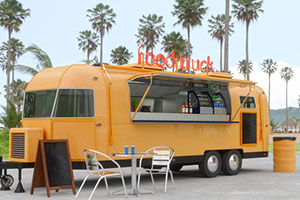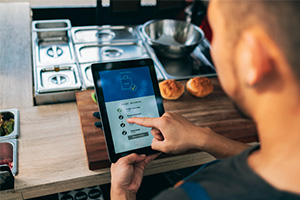Running a food truck business can be an exhilarating adventure, but amidst the hustle and bustle, it’s crucial not to overlook the importance of having proper insurance coverage. The appropriate combination of insurance policies can act as a safety net, safeguarding your business investments from unexpected financial loss. Most importantly, it provides you with peace of mind to continue focusing on serving your unique delectable. So, let’s take a look and explore the insurance policies you need to be tailored specifically for food truck owners.
Types of Mobile Food Trucks and Carts We Insure
As the food truck industry continues to evolve, so do the vehicles that bring these mobile eateries to life. The most common types of food trucks and carts we insure are:

- Step vans / Food trucks
- Cargo van
- Travel trailers
- Food carts and stalls
- Airstreams
What Kind of Insurance Do I Need For My Food Truck?
The best type of coverage should include a combination of business insurance policies to protect you from a range of risks. Generally, a food truck owner will need a business owner’s policy (BOP), commercial auto insurance, and workers’ compensation policies. Here’s a breakdown of each coverage:
1. Business Owner Policy
A business owner policy bundles three essential coverage types. It’s usually cheaper than buying each coverage separately. A BOP includes:

General Liability Insurance: This is the most important of all business insurance policies. General liability insurance protects your business against lawsuits arising from bodily injuries and property damage you accidentally cause to others (not including your employees). For example, if you accidentally spill hot coffee on a customer, your general liability insurance would cover their medical expenses.

Commercial Property Insurance: Even if you do not have a consistent physical location where you serve your customers, this type of insurance covers the commercial space your business is housed in, along with your equipment and inventory. For example, commercial property insurance would pay to replace your belongings if a fire wipes out your building and equipment.

Business Income Insurance: If you temporarily shut down your business due to a problem covered by your policy, business interruption insurance replaces lost income. It covers various issues, like lost earnings, payroll expenses, temporary relocation, and other operational expenses.
2. Commercial Auto Insurance

Because your food truck is used for business purposes, you’ll need a commercial auto insurance policy. Your personal car insurance policy will not protect you. A commercial auto insurance policy offers:
- Bodily Injury – This type of liability insurance provides payment in cases of bodily injury or death resulting from an accident for which you are at fault. This may also include legal defense expenses should you be sued by the other driver.
- Property Damage – If your vehicle accidentally damages another person’s vehicle or property, this coverage helps pay for their repairs.
- Combined Single Limit (CSL) – This combines one overall limit for property damage and bodily injury claims against you rather than having separate limits.
- Medical Payments (PIP) – Also known as Personal Injury Protection in some states, this coverage provides payment for any medical expenses arising from an employee or a passenger traveling in your vehicle, regardless of who is at fault in an accident.
- Uninsured/Underinsured Motorist Coverage – Uninsured motorist coverage provides payment for any medical expenses caused by a hit-and-run or uninsured driver. Underinsured motorist coverage covers the shortfall up to your policy’s limits when the other party has insufficient coverage. In some states, you can purchase uninsured motorist property damage insurance to cover damage to your car from an uninsured driver.
- Comprehensive Coverage – Comprehensive insurance covers damage to your vehicle after a non-collision-related incident. The most common examples are theft, vandalism, and fire, and they may also protect permanently attached appliances and equipment.
- Collision Coverage – Collision insurance helps covers the cost of replacing or repairing your vehicle if you or your employees get into a car crash. It can also protect permanently attached appliances and equipment.
3. Workers’ Compensation
Workers’ compensation helps protect you as a business owner from potential lawsuits and avoids the actual cost of an employee’s medical expenses and lost wages following a workplace injury or illness. Most states require workers’ compensation insurance, even if you employ only one worker. It can help cover an employee’s medical bills, lost wages, disability benefits, and funeral costs.
Other Food Truck Insurance Businesses Should Consider

Although a BOP and commercial auto policy provides you with a majority of protection for your food truck business, it does not cover all the risk gaps your business might face. Consider adding some of these small business insurance coverage:
- Commercial Umbrella Insurance: Commercial umbrella insurance adds an extra layer of protection on top of your business insurance policies. These policies include general liability, commercial auto, workers’ compensation, and professional liability.
- Food Spoilage and Contamination Insurance: If the refrigerator or freezer breaks down, this insurance coverage compensates for your “perishable stock”. This coverage also covers you after a food-borne illness outbreak.
- Equipment Breakdown Insurance: If your food truck equipment, like grills, freezers, or ovens, unexpectedly breakdown, equipment breakdown insurance can help cover the costs to replace or repair your equipment. However, it does not cover normal wear and tear.
- Inland Marine Insurance: Inland marine insurance covers equipment and products while it’s being transported or temporarily stored at an off-site location. This coverage can also protect rented or leased equipment.
- Liquor Liability Insurance: If your food truck business sells or serves alcohol, liquor liability insurance covers property damage and bodily injuries caused by an intoxicated person to others after you sell or serve them liquor. It covers legal costs, judgments, settlements, medical expenses, and repair bills.
How AIS Can Help Protect Your Food Truck Business
We know you’ve worked hard to build your business and we’re committed to helping you protect it. Speak with one of our Commercial Insurance Specialists today at (866) 570-7335 for a quick and easy free quote.
The information in this article is obtained from various sources and offered for educational purposes only. Furthermore, it should not replace the advice of a qualified professional. The definitions, terms, and coverage in a given policy may differ from those suggested here. No warranty or appropriateness for a specific purpose is expressed or implied.


